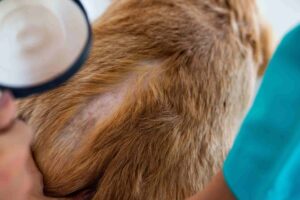Results of an Italian study indicate that conjugated linoleic acid is not effective, at the dosage used, in improving atopic dermatitis in dogs, while blackcurrant seed juice might be helpful, although solid evidence is still lacking to recommend it as a treatment
Atopic dermatitis is a rather common skin disorder of allergic origin in dogs: in fact, it is estimated to affect about 10% of the population, with varying degrees of severity and intensity of symptoms.
Although no definitive cure for canine atopic dermatitis is yet available, there are several treatment options that can be employed to counter the disorder: allergen contact prevention, allergen-specific immunotherapy, antimicrobial therapy, and anti-inflammatory or immunomodulatory drugs.
Among substances with anti-inflammatory properties, polyunsaturated fatty acids have been particularly studied in canine allergic dermatologic diseases with widely varying results in terms of efficacy.
Black currant seed oil contains a high amount of these fatty acids, and in a previous double-blind, placebo-controlled study, it was shown to be effective in improving atopic dermatitis in dogs, although statistical significance was not reached in the results.
Conjugated linoleic acid has also received special attention regarding the possible treatment of canine atopic dermatitis because of its immunological properties: in the laboratory, it has been shown to inhibit histamine release and eicosanoid production and to reduce itching. However, its possible role in the treatment of atopic dermatitis in dogs has not yet been evaluated.
Therapeutic strategies on trial
With the goal of gaining more insight into possible therapies for canine atopic dermatitis, a group of Italian researchers conducted a study in which they evaluated the efficacy of conjugated linoleic acid, black currant seed oil, and a combination of the two compared with placebo. In addition, the study aimed to investigate the changes in fatty acid metabolism induced by these treatments.
The twenty-four participating dogs were randomly assigned to 4 groups and treated with daily oral therapy for 2 months at a dose of 1 ml/10 kg: the first group received 80% pure conjugated linoleic acid, the second pure black currant seed oil, the third the combination of the two substances, both at a dose of 1 ml/10 kg, and the last group placebo, consisting of sucrose syrup.
At days 0, 30 and 60, blood samples were taken for metabolic analysis, the owners assessed itching and the veterinarians assessed the presence of any skin lesions.
Twenty dogs completed the study.
Regarding the extent and severity of dermatitis, assessed by the CADESI score (Canine Atopic Dermatitis Extent and Severity Index), and itching, as measured by the VAS score (Visual Analogue Scale)), the most significant percentage reduction is observed in the group treated with black currant seed oil alone. However, the improvement in these clinical parameters is not found to be statistically significant in any of the groups or at any of the times when the analysis was performed.
Analyses conducted on serum show that both conjugated linoleic acid and blackcurrant seed oil are well metabolized; however, while gammalinolenic acid (GLA) and dihomo-gammalinolenic acid (DGLA) concentrations increase in the group treated with blackcurrant seed oil alone, this is not the case in dogs treated with both substances, indicating a possible inhibitory effect of conjugated linoleic acid when administered together with omega-6 fatty acids.
Conclusions
“Conjugated linoleic acid at a dosage of 90 mg/kg per day has not been shown to be effective in improving the clinical signs of canine atopic dermatitis. In addition, combinazoine with omega-6 fatty acids may reduce its efficacy,” the study authors comment. “Black currant seed oil administered alone gave the best clinical results, although not significant, and may be useful in some dogs with atopic dermatitis. Further studies are needed to confirm its potential efficacy and to investigate the effect of conjugated linoleic acid at higher doses and its combination with omega-3 fatty acids. Preliminary, as yet unpublished data, in fact, seem to suggest that there is no interference in this case indicating the desirability of investigating possible synergies.”
Reference
Noli C, Carta G, Cordeddu L, et al. Conjugated linoleic acid and black currant seed oil in the treatment of canine atopic dermatitis: a preliminary report. Vet J. 2007 Mar;173(2):413-21.







